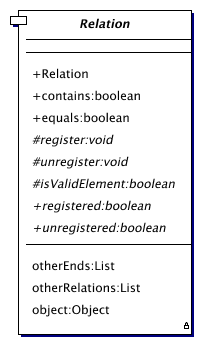
|
|||||||||
| PREV CLASS NEXT CLASS | FRAMES NO FRAMES | ||||||||
| SUMMARY: INNER | FIELD | CONSTR | METHOD | DETAIL: FIELD | CONSTR | METHOD | ||||||||
java.lang.Object | +--org.jutil.relation.Relation
A class of objects that can be used to set up bi-directional relations between objects.

This class provides the general interface that is needed in order to create different types of bindings that can be created by taking two arbitrary multiplicities.
| Constructor Summary | |
Relation(java.lang.Object object)
Initialize a new Relation for the given object. |
|
| Method Summary | |
boolean |
contains(Relation relation)
Check whether or not the given Relation is connected to this one. |
boolean |
equals(java.lang.Object other)
|
java.lang.Object |
getObject()
Return the object on the n side of the 1-n binding represented by this OneSide |
abstract java.util.List |
getOtherEnds()
Return the objects on the other side of the binding. |
abstract java.util.List |
getOtherRelations()
Return the Relations on the other side of the binding. |
protected abstract boolean |
isValidElement(Relation relation)
Check whether or not the given Relation may be connected to this Relation. |
protected abstract void |
register(Relation other)
Add the given Relation as a participant in this binding. |
abstract boolean |
registered(java.util.List oldConnections,
Relation registered)
Check whether or not the current state corresponds to connecting to the given Relation when being connected to the Relations in the given list. |
protected abstract void |
unregister(Relation other)
Remove the given Relation as a participant in this binding. |
abstract boolean |
unregistered(java.util.List oldConnections,
Relation unregistered)
Check whether or not the current state corresponds to disconnecting from the given Relation when being connected to the Relations in the given list. |
| Methods inherited from class java.lang.Object |
clone, finalize, getClass, hashCode, notify, notifyAll, toString, wait, wait, wait |
| Constructor Detail |
public Relation(java.lang.Object object)
object - The object at this side of the binding.| Method Detail |
public boolean contains(Relation relation)
relation - The relation which is possibly on the other end
of the binding.public boolean equals(java.lang.Object other)
protected abstract void register(Relation other)
protected abstract void unregister(Relation other)
protected abstract boolean isValidElement(Relation relation)
public abstract boolean registered(java.util.List oldConnections,
Relation registered)
oldConnections - The List of Relations this Relation was connected to before.registered - The Relation this Relation has connected to.
public abstract boolean unregistered(java.util.List oldConnections,
Relation unregistered)
oldConnections - The List of Relations this Relation was connected to before.registered - The Relation this Relation has connected to.public abstract java.util.List getOtherEnds()
public abstract java.util.List getOtherRelations()
public java.lang.Object getObject()
|
|||||||||
| PREV CLASS NEXT CLASS | FRAMES NO FRAMES | ||||||||
| SUMMARY: INNER | FIELD | CONSTR | METHOD | DETAIL: FIELD | CONSTR | METHOD | ||||||||